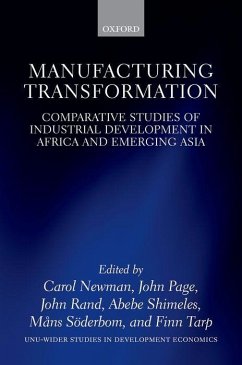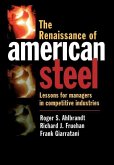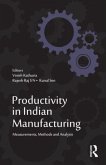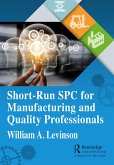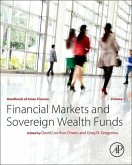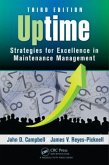Carol Newman
Manufacturing Transformation
Comparative Studies of Industrial Development in Africa and Emerging Asia
Carol Newman
Manufacturing Transformation
Comparative Studies of Industrial Development in Africa and Emerging Asia
- Gebundenes Buch
- Merkliste
- Auf die Merkliste
- Bewerten Bewerten
- Teilen
- Produkt teilen
- Produkterinnerung
- Produkterinnerung
This book addresses three questions: Why is there so little industry in Africa? Does it matter? And, what can be done about it?
Andere Kunden interessierten sich auch für
![The Renaissance of American Steel The Renaissance of American Steel]() Roger S AhlbrandtThe Renaissance of American Steel77,99 €
Roger S AhlbrandtThe Renaissance of American Steel77,99 €![Productivity in Indian Manufacturing Productivity in Indian Manufacturing]() Productivity in Indian Manufacturing60,99 €
Productivity in Indian Manufacturing60,99 €![Short-Run SPC for Manufacturing and Quality Professionals Short-Run SPC for Manufacturing and Quality Professionals]() William A LevinsonShort-Run SPC for Manufacturing and Quality Professionals161,99 €
William A LevinsonShort-Run SPC for Manufacturing and Quality Professionals161,99 €![Handbook of Asian Finance Handbook of Asian Finance]() Handbook of Asian Finance123,99 €
Handbook of Asian Finance123,99 €![Uptime Uptime]() John D CampbellUptime71,99 €
John D CampbellUptime71,99 €![Liquid Lean Liquid Lean]() Raymond C FloydLiquid Lean69,99 €
Raymond C FloydLiquid Lean69,99 €![Harper's Ferry, West Virginia: Its Water Power And Works And Superior Advantage For Manufacturing Purposes Harper's Ferry, West Virginia: Its Water Power And Works And Superior Advantage For Manufacturing Purposes]() Harper's Ferry, West Virginia: Its Water Power And Works And Superior Advantage For Manufacturing Purposes28,99 €
Harper's Ferry, West Virginia: Its Water Power And Works And Superior Advantage For Manufacturing Purposes28,99 €-
-
-
This book addresses three questions: Why is there so little industry in Africa? Does it matter? And, what can be done about it?
Produktdetails
- Produktdetails
- Verlag: Sydney University Press
- Seitenzahl: 352
- Erscheinungstermin: 28. September 2016
- Englisch
- Abmessung: 236mm x 160mm x 23mm
- Gewicht: 612g
- ISBN-13: 9780198776987
- ISBN-10: 0198776985
- Artikelnr.: 47866839
- Verlag: Sydney University Press
- Seitenzahl: 352
- Erscheinungstermin: 28. September 2016
- Englisch
- Abmessung: 236mm x 160mm x 23mm
- Gewicht: 612g
- ISBN-13: 9780198776987
- ISBN-10: 0198776985
- Artikelnr.: 47866839
Carol Newman is Associate Professor at the Department of Economics, Trinity College Dublin and a non-resident Senior Research Fellow at UNU-WIDER. Her research is the microeconomics of development with a focus on both household and enterprise behaviour. She has published widely in the fields of development economics and agricultural economics, in particular in the area of enterprise dynamics and performance in developing countries. John Page is a Senior Fellow in the Global Economy and Development Program at the Brookings Institution and a Non-resident Senior Fellow of the World Institute for Development Economics Research (UNU-WIDER). He is also visiting professor at the National Graduate Institute for Policy Studies, Tokyo, Japan and a Research Associate of the Centre for the Study of African Economies at Oxford University. From 1980 to 2008 he was at the World Bank where his senior positions included: Director, Poverty Reduction, Director, Economic Policy, and Chief Economist, Africa. He is the author of several books and more than 100 published papers on economic development. John Rand is a professor of development economics at the University of Copenhagen. His research focus includes industrial policy and firm dynamics, quantitative impact evaluation of development projects, and macroeconomics of international capital flows. He has significant research experience through project involvement in Bangladesh, Cambodia, Egypt, Ethiopia, Ghana, Kenya, Mozambique Nicaragua, Rwanda, Senegal, Tanzania, Tunisia, Uganda, and Vietnam. He is co-editor of the European Journal of Development Research, member of the Steering Committee of the Joint MFS II Evaluations Programme in Holland, and since 2015, Deputy Director of the Development Economics Research Group (DERG), Department of Economics, University of Copenhagen. Abebe Shimeles received his postgraduate degrees in economics from Gothenburg University and the Delhi School of economics and a BA from Addis Ababa University. He is Acting Director, Development Research Department at the African Development Bank. He is also Research Fellow at IZA, and Adjunct Associate Professor at University of Cape Town. He has worked for the World Bank, UNECA, ActionAid, and Addis Ababa University in different capacities. His current research focuses on labour markets, impact evaluation of tax policies, community-based health insurance, and on inequality, market distortions and domestic violence. Måns Söderbom is Professor of Economics in the Department of Economics at the University of Gothenburg. He is also a Research Associate at the Centre for the Study of African Economies (CSAE), Department of Economics, University of Oxford, a Fellow of the European Development Research Network, and a non-resident Senior Research Fellow at UNU-WIDER. His research has been published by leading international journals and he has also contributed to several books on economic development. Industrial development is his main area of interest, but he has also worked on civil conflict, labour markets, and schooling. Finn Tarp has some 37 years of experience in academic and applied development economics research and teaching. His field experience covers more than 20 years of in-country work in 35 countries across Africa and the developing world more generally. Professor Tarp is a leading international expert on issues of development strategy and foreign aid, with an interest in poverty, income distribution and growth, micro- and macroeconomic policy and modeling, agricultural sector policy and planning, household and enterprise development, and economic adjustment and reform. He has published almost 90 articles in international academic journals alongside various books. He is a member of the World Bank Chief Economist's 15 member 'Council of Eminent Persons'.
* 1: Carol Newman
John Page
John Rand
Abebe Shimeles
Måns Söderbom
and Finn Tarp: The Pursuit of Industry: Policies and Outcomes * Part I: Industrial Development in Africa * 2: Mulu Gebreeyesus: Industrial Policy and Development in Ethiopia * 3: Charles Ackah
Charles Adjasi
and Festus Turkson: Industrial Policy in Ghana: Its Evolution and Impact * 4: Dianah Ngui
Jacob Chege
and Peter Kimuyu: Kenya's Industrial Development: Policies
Performance and Prospects * 5: António Sousa Cruz
Dina Guambe
Constantino Pedro Marrengula
and Amosse Francisco Ubisse: Mozambique's Industrial Policy: Sufficient to Face the Winds of Globalization? * 6: Louis N. Chete
John Adeoti
Foluso Adeyinka
and Femi Oladapo Ogundele: Industrial Policy in Nigeria: Opportunities and Challenges in a Resource-Rich Country * 7: Fatou Cissé
Ji Eun Choi
and Mathilde Maurel: Industrial Policy in Senegal: Then and Now * 8: Jamal Msami and Samuel Wangwe: Industrial Development in Tanzania * 9: Mohamed Ayadi and Wided Mattoussi: Tunisia: Industrial Policy in the Transition to Middle-Income Status * 10: Isaac Shinyekwa
Julius Kiiza
Eria Hisali
and Marios Obwona: The Evolution of Industry in Uganda * Part II: Industrial Development in Emerging Asia * 11: Sokty Chhair and Luyna Ung: Cambodia's Path to Industrial Development: Policies
Lessons
and Opportunities * 12: Nguyen Thi Tue Ann
Luu Minh Duc
and Trinh Duc Chieu: The Evolution of Vietnamese Industry * 13: Carol Newman
John Page
John Rand
Abebe Shimeles
Måns Söderbom
and Finn Tarp: Can Africa Industrialize?
John Page
John Rand
Abebe Shimeles
Måns Söderbom
and Finn Tarp: The Pursuit of Industry: Policies and Outcomes * Part I: Industrial Development in Africa * 2: Mulu Gebreeyesus: Industrial Policy and Development in Ethiopia * 3: Charles Ackah
Charles Adjasi
and Festus Turkson: Industrial Policy in Ghana: Its Evolution and Impact * 4: Dianah Ngui
Jacob Chege
and Peter Kimuyu: Kenya's Industrial Development: Policies
Performance and Prospects * 5: António Sousa Cruz
Dina Guambe
Constantino Pedro Marrengula
and Amosse Francisco Ubisse: Mozambique's Industrial Policy: Sufficient to Face the Winds of Globalization? * 6: Louis N. Chete
John Adeoti
Foluso Adeyinka
and Femi Oladapo Ogundele: Industrial Policy in Nigeria: Opportunities and Challenges in a Resource-Rich Country * 7: Fatou Cissé
Ji Eun Choi
and Mathilde Maurel: Industrial Policy in Senegal: Then and Now * 8: Jamal Msami and Samuel Wangwe: Industrial Development in Tanzania * 9: Mohamed Ayadi and Wided Mattoussi: Tunisia: Industrial Policy in the Transition to Middle-Income Status * 10: Isaac Shinyekwa
Julius Kiiza
Eria Hisali
and Marios Obwona: The Evolution of Industry in Uganda * Part II: Industrial Development in Emerging Asia * 11: Sokty Chhair and Luyna Ung: Cambodia's Path to Industrial Development: Policies
Lessons
and Opportunities * 12: Nguyen Thi Tue Ann
Luu Minh Duc
and Trinh Duc Chieu: The Evolution of Vietnamese Industry * 13: Carol Newman
John Page
John Rand
Abebe Shimeles
Måns Söderbom
and Finn Tarp: Can Africa Industrialize?
* 1: Carol Newman
John Page
John Rand
Abebe Shimeles
Måns Söderbom
and Finn Tarp: The Pursuit of Industry: Policies and Outcomes * Part I: Industrial Development in Africa * 2: Mulu Gebreeyesus: Industrial Policy and Development in Ethiopia * 3: Charles Ackah
Charles Adjasi
and Festus Turkson: Industrial Policy in Ghana: Its Evolution and Impact * 4: Dianah Ngui
Jacob Chege
and Peter Kimuyu: Kenya's Industrial Development: Policies
Performance and Prospects * 5: António Sousa Cruz
Dina Guambe
Constantino Pedro Marrengula
and Amosse Francisco Ubisse: Mozambique's Industrial Policy: Sufficient to Face the Winds of Globalization? * 6: Louis N. Chete
John Adeoti
Foluso Adeyinka
and Femi Oladapo Ogundele: Industrial Policy in Nigeria: Opportunities and Challenges in a Resource-Rich Country * 7: Fatou Cissé
Ji Eun Choi
and Mathilde Maurel: Industrial Policy in Senegal: Then and Now * 8: Jamal Msami and Samuel Wangwe: Industrial Development in Tanzania * 9: Mohamed Ayadi and Wided Mattoussi: Tunisia: Industrial Policy in the Transition to Middle-Income Status * 10: Isaac Shinyekwa
Julius Kiiza
Eria Hisali
and Marios Obwona: The Evolution of Industry in Uganda * Part II: Industrial Development in Emerging Asia * 11: Sokty Chhair and Luyna Ung: Cambodia's Path to Industrial Development: Policies
Lessons
and Opportunities * 12: Nguyen Thi Tue Ann
Luu Minh Duc
and Trinh Duc Chieu: The Evolution of Vietnamese Industry * 13: Carol Newman
John Page
John Rand
Abebe Shimeles
Måns Söderbom
and Finn Tarp: Can Africa Industrialize?
John Page
John Rand
Abebe Shimeles
Måns Söderbom
and Finn Tarp: The Pursuit of Industry: Policies and Outcomes * Part I: Industrial Development in Africa * 2: Mulu Gebreeyesus: Industrial Policy and Development in Ethiopia * 3: Charles Ackah
Charles Adjasi
and Festus Turkson: Industrial Policy in Ghana: Its Evolution and Impact * 4: Dianah Ngui
Jacob Chege
and Peter Kimuyu: Kenya's Industrial Development: Policies
Performance and Prospects * 5: António Sousa Cruz
Dina Guambe
Constantino Pedro Marrengula
and Amosse Francisco Ubisse: Mozambique's Industrial Policy: Sufficient to Face the Winds of Globalization? * 6: Louis N. Chete
John Adeoti
Foluso Adeyinka
and Femi Oladapo Ogundele: Industrial Policy in Nigeria: Opportunities and Challenges in a Resource-Rich Country * 7: Fatou Cissé
Ji Eun Choi
and Mathilde Maurel: Industrial Policy in Senegal: Then and Now * 8: Jamal Msami and Samuel Wangwe: Industrial Development in Tanzania * 9: Mohamed Ayadi and Wided Mattoussi: Tunisia: Industrial Policy in the Transition to Middle-Income Status * 10: Isaac Shinyekwa
Julius Kiiza
Eria Hisali
and Marios Obwona: The Evolution of Industry in Uganda * Part II: Industrial Development in Emerging Asia * 11: Sokty Chhair and Luyna Ung: Cambodia's Path to Industrial Development: Policies
Lessons
and Opportunities * 12: Nguyen Thi Tue Ann
Luu Minh Duc
and Trinh Duc Chieu: The Evolution of Vietnamese Industry * 13: Carol Newman
John Page
John Rand
Abebe Shimeles
Måns Söderbom
and Finn Tarp: Can Africa Industrialize?

